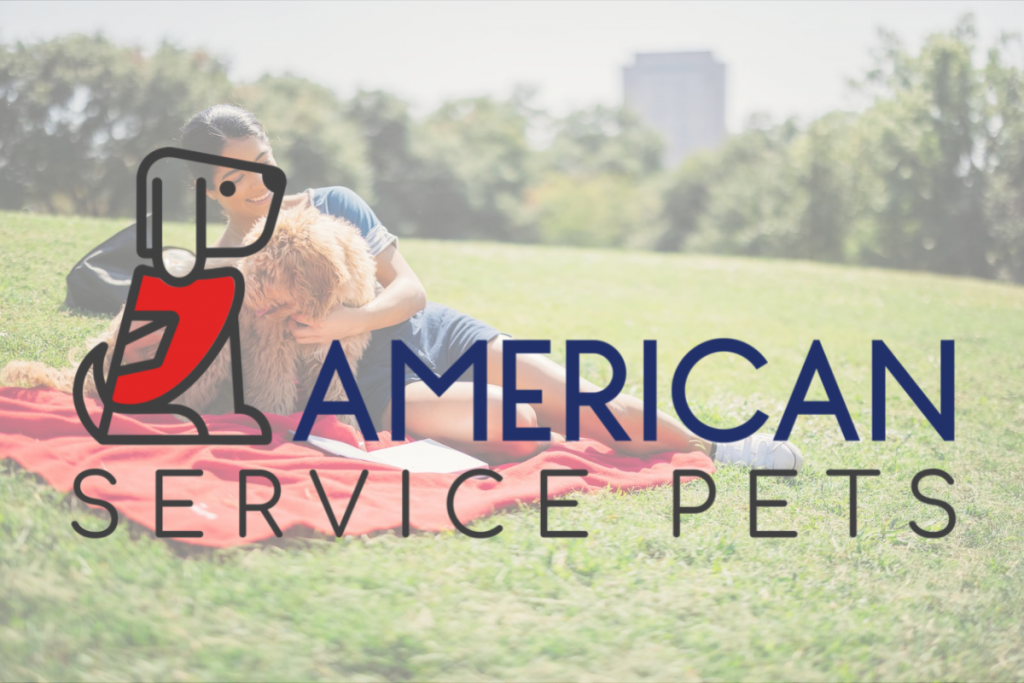How to Get Your Emotional Support Animal Certification
in Minnesota

Many people coping with the symptoms of emotional disorders rely on the comfort and support of their pets to help them through the day. Illnesses such as PTSD, depression, and anxiety can make everyday tasks and social situations challenging without the assistance of an Emotional Support Animal (ESA).
State and federal laws protect the rights of people who own these animals in certain circumstances, but many people, such as landlords, are less supportive of the idea. Landlords have the right to enforce any pet restrictions by evicting tenants without the proper documentation designating their animal as an ESA. They can also face penalties if they don’t follow other laws governing Emotional Support Animals.
American Service Pets believes strongly in the benefits of ESAs for people who need their support. We’re dedicated to helping you qualify for your animal with a Minnesota Emotional Support Animal letter to get the loving care you need without having to pay pet deposits or extraneous fees.
3 Benefits of Emotional Support Animals
An Emotional Support Animal is a documented therapeutic animal, usually a dog, that helps its owner manage the problematic parts of their day. Laws in Minnesota and federal laws protect the rights of people coping with mental illness or emotional distress to have their emotional support animal in their rental home. The law recognizes the need for these unique animals and the benefits they provide. Here are the top three:
Mood Booster
Pets make you feel good because interacting with them increases levels of serotonin and dopamine, the body’s natural mood enhancers. They welcome you home with excitement and are always happy to be in your company, and that delivers therapeutic benefits.
Naturopathic Medicine
The health benefits of caring for an animal you love are like those of prescription depression medications but without the associated risks. Emotional Support Animals are a natural treatment for many symptoms of emotional illness. They also boost physical health by encouraging outdoor activity.
Authentic Support
Panic and anxiety attacks can happen at any moment. The effects of emotional trauma last for years, and an ESA can help its owner in such times of need. Pets naturally bring a smile, chuckle, and heartwarming feelings to those around them.
Some aspects of life with emotional impairments are challenging for people to navigate without their ESA. American Service Pets provides a fast and easy way for pet owners to get approved in just a few minutes.
Take the test to see if you qualify for an ESA Minnesota letter now.
Minnesota Emotional Support Animal Laws
Minnesota state law acknowledges the mental health impacts of these unique animals, even though they’re not specifically trained. Comfort animals provide emotional support and companionship, unlike Psychiatric Service Animals (PSAs) trained to execute lifesaving duties and specialized tasks to assist people with disabilities. PSAs and ESAs perform different jobs, so they have distinct privileges under the law.
Comfort animals need an authentic ESA letter to enjoy legal privileges in Minnesota. Official letters are accepted nationwide, but states may have different rules, so it’s advisable to research the rights of ESA Minnesota owners in a given state before traveling or relocating there. Here’s a summary of the significant points in Minnesota:
Housing Laws
Minnesota Emotional Support Animal housing laws dictate that rental tenants can’t be turned down for housing, charged a pet deposit, or evicted for owning an ESA. Landlords have the right to view their tenant’s ESA letter but cannot demand proof of a mental diagnosis. Landlords can still turn away a support animal for rental housing if it’s too big or poses a safety risk or health concerns.


Public Places
Emotional Support Animals aren’t guaranteed public access in Minnesota by any state or federal law. Malls, shopping centers, grocery stores, clothiers, restaurants, and other public places are under no legal liability to allow them access to their facilities. Laws are different for Psychiatric Service Animals, or PSAs, however, since they are formally trained to perform life saving tasks.
Workplace Laws
The Americans with Disabilities Act upholds the rights of the disabled to use a PSA at work, but ESAs aren’t supported under this act in Minnesota. Getting a Minnesota Emotional Support Animal letter could be the defining factor in persuading a compassionate employer, though.


Travel Laws
The Air Carrier Access Act once supported Emotional Support Animals in a plane’s cabin with their owner, but a change in 2020 now leaves that to the airline’s discretion. Only official PSAs are permitted to ride in the cabin with their owners free of charge. ESAs are not guaranteed access to public transportation in Minnesota, including buses, trains, subways, and ride-share services.
American Service Pets understands the power of an Emotional Support Animal to a person battling emotional troubles. We’re honored to offer an easy three-step process to provide ESA letters to Minnesota residents.
FAQ
The Basics
Yes, in addition to following the federal Americans with Disabilities Act (ADA), The Minnesota Human Rights Act also helps ensure individuals with service animals can live discrimination-free when it comes to housing, employment, and public places.
A service animal is specially trained to perform specific tasks for a person with a disability. Minnesota’s Department of Human Rights website says examples of a service dog might be a guide for an individual with a vision impairment, a seizure detection animal, or an animal that keeps an individual calm during a panic attack.
According to Minnesota statutes, a person with a disability is any individual who has (or is on record of having) “a physical, mental, or emotional impairment which substantially limits one or more major life activities.”
The state and the ADA say that dogs (and in rare cases, miniature horses) qualify as service animals.
As of 2018, it is a petty misdemeanor in Minnesota to misrepresent an animal as a service animal in order to take advantage of the rights granted to those with service animals. Subsequent offenses are considered misdemeanors.
Yes, Minnesota state statutes mention that a person training a dog to be a service dog has the right to be accompanied by said dog in any public accommodations.
Neither the ADA nor Minnesota’s laws cover emotional support animals due to the fact that they are not trained.
FAQ
Public Accommodations & Travel with a Service Animal
Minnesota says that people with disabilities are entitled to bring their service animals into all public accommodations, which includes streets, highways, sidewalks, and walkways; all public buildings, facilities, and places; all common carriers and modes of transportation; all hotels and lodging places; all places of public resort, amusement, or accommodation; and any other place to which the public is invited.
Public establishments cannot ask any questions beyond whether or not the animal is a service animal and what task(s) it is trained to perform.
Religious entities are not considered public accommodations by the ADA. Neither are private clubs, unless they regularly make facilities available to nonmembers. In terms of places that do fall under public accommodations law, service animals can still be removed or denied entry if they are not housebroken, out of control, or causing immediate threat of harm to other patrons.
Transportation listed in Minnesota statutes under public accommodations includes airplanes, motor vehicles, railroad trains, motor buses, boats, or any other public conveyances or modes of transportation. It is important to note however, that airplane travel with a service animal falls under the federal Air Carrier Access Act (ACAA) and is therefore subject to additional regulations.
Generally the ADA says that service animals should be harnessed, leashed, or tethered, unless these devices interfere with the service animal’s work. In that case, the animal must be able to be controlled through another method, such as voice commands or signals.
According to Minnesota’s Department of Human Rights, employees do not have an automatic right to have a service or a support animal in the workplace. They must first request a reasonable accommodation, which can be denied if the animal poses a significant health or safety risk, or if granting the request would impose a significant burden on the employer.
Service dogs are generally allowed in any places in a hospital where the general public would be allowed. They may be barred from sterile hospital environments like operating rooms or burn units though.
If it is determined that discrimination has occurred, the guilty party may be subject to a civil penalty and a judge may order the payment of compensatory and punitive damages be paid to the individual who was discriminated against.
Minnesota follows the Air Carrier Access Act (ACAA), which defines a service animal as a dog (regardless of breed or size) trained to do work or perform tasks to assist a qualified individual with a diability, and may include psychiatric service dogs. Minature horses are excluded in this definition.
Airlines can require a passenger to provide a U.S. Department of Transportation (DOT) form attesting to the animal’s health, behavior, and training and a U.S. DOT form attesting that the animal can either not relieve itself or can relieve itself in a sanitary manner (if the animal will be on a flight that is 8 or more hours).
The ACAA does not address service animals in-training, so airlines are not required to carry them as they do not meet the requirements of an ACAA-defined service animal. However, airlines can make their own individual policies.
FAQ
Housing Law
Simply put, no-pet policies do not apply to service animals. Tenants must request a reasonable accommodation for their service animal and may be asked for documentation to describe how the animal helps them, but the Minnesota Human Rights Act does not require any special registration for service animals in housing.
Landlords can insist that tenants who have PSAs or ESAs comply with local ordinances requiring animal licensing and immunization. Tenants must also comply with laws or ordinances forbidding certain wild or exotic animals on the basis of public health and safety concerns.
Yes, if the animal causes damage beyond normal “wear and tear,” you may be subject to damage fees.
Yes. As long as you have requested a reasonable accommodation and it has been accepted by your landlord, you cannot be forced to pay additional “pet rent” for your ESA. Landlords also cannot generally limit the number or type of ESAs a tenant can have, unless it creates an undue burden on the landlord or there are local ordinances restricting certain exotic animals or the number of animals in a home.
FAQ
Discrimination Complaints
You can report incidents of discrimination that you have experienced or witnessed to the Minnesota Department of Human Rights. These incidents can be reported online or by calling the Discrimination Helpline at 1-833-454-0148, but they must be reported within one year of the alleged act.
The process for reporting housing discrimination within the state is the same as discrimination in any other location – you should contact the Minnesota Department of Human Rights via an online form or the Discrimination Helpline (1-833-454-0148).
How to Get an ESA Letter in Minnesota
American Service Pets is dedicated to streamlining the ESA qualification process as much as possible, so no one is denied the therapeutic benefit of the pet they love. Getting an Emotional Support Animal in Minnesota involves only three quick steps:
Fill Out the Questionnaire
It takes approximately three to five minutes to answer the American Service Pets questionnaire to determine your eligibility for approval.
Get a Doctor’s Approval
American Service Pets allows you to submit your file to a licensed Minnesota-approved doctor or other licensed mental health provider for authorization. Doctors are always available, and they approve most requests within three to five minutes. Official letters are emailed immediately.
Add Your Pet to the National Directory
Add your pet to the national directory to get a convenient online profile that shows your pet’s status and ESA letter for public view.
Get approved today to make life easier for you and your ESA. American Service Pets accepts approximately 95% of applicants within half an hour.
The American Service Pets Advantage
American Service Pets has helped over 45,000 ESA owners qualify for their Emotional Support Animal. Here’s what makes us the right choice for you:
- The opportunity to talk with a Minnesota medical professional
- Free qualification process
- No prescription required
- All-in-one solution to support animal approval issues

Answer the five easy yes or no questions to get approved for an ESA today with American Service Pets. We’re committed to helping people suffering from emotional issues get the therapeutic benefits of the animal they love.
Experts in Nationwide Support Animal Approval
Approval to own an Emotional Support Animal in Minnesota is the solution to rental housing issues and possibly other places that deny access to your companion. American Service Pets aids pet owners in getting the help they need to keep them from being separated from their Emotional or Psychiatric Support Animal. Take our test today for approval in less than half an hour.
Disclaimer: We would like to emphasize that while the terms “certification” or “registration” may be used in relation to Emotional Support Animals, there is no official certification process for ESAs or any form of ESA registry as of this date. As such, the use of these terms should not be interpreted as legally recognized designations by government or regulatory authorities. Remember, ESAs can provide a valuable source of comfort and support, but their recognition relies on proper documentation from a healthcare professional and adherence to relevant laws and guidelines.

